This guide is for the search arbitrage provider SEDO.
Search arbitrage tracking in general can be quite tricky given the presence of keywords and various required data parameters.
Depending on how you want to pass this data, there are also multiple approaches.
Below we'll describe the basic setup using our offer source template, and the two approaches you can use for testing different keywords.
Creating the Sedo offer source
Firstly, create a new offer source and use our Sedo template.
Note the data passing section, which is quite complex at first glance:
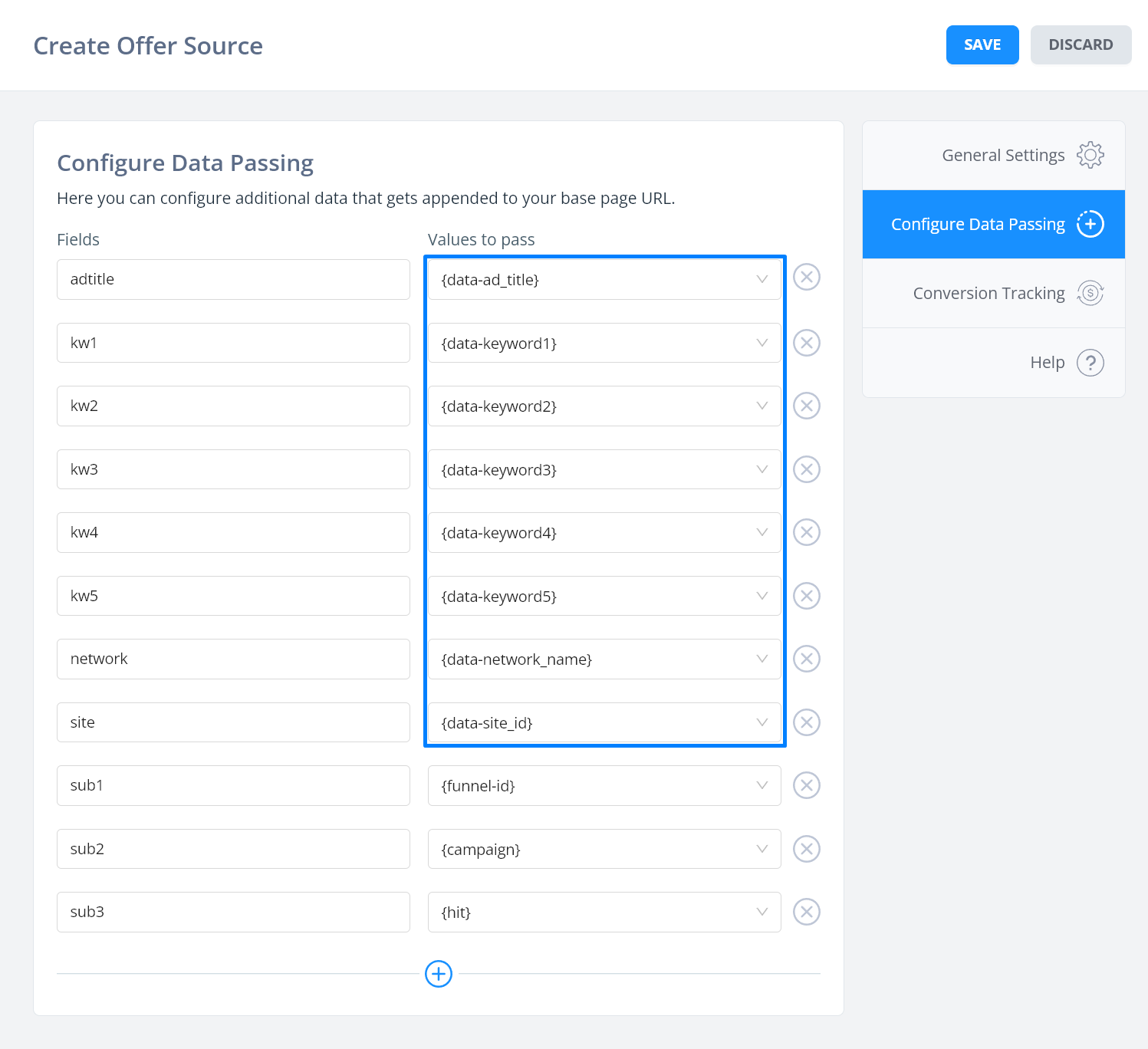
All the tokens in the blue box are {data-xxx} tokens, which means they come from the URL parameters used in the tracking link.
This means a lot of your data passing is going to start at the ad-level where parameters are passed -- though as you'll see later, we can also override this at the offer level.
Here there are some very important things to consider:
- We are passing adtitle, site and network using
{data-xxx}parameters. So, these will be set in the traffic source link. - We are also passing five keyword params! These also need to be set in the traffic source config, though you can override them at the offer level later
- You can hard-code the network name (since a traffic source is always going to have the same name)
- We are passing our unique hit ID for tracking under
sub3- so the postback used in Sedo must pass this value back
Now, checking the conversion tracking tab, you can see the templated postback, which you should place at Sedo (but of course use the one from your account):
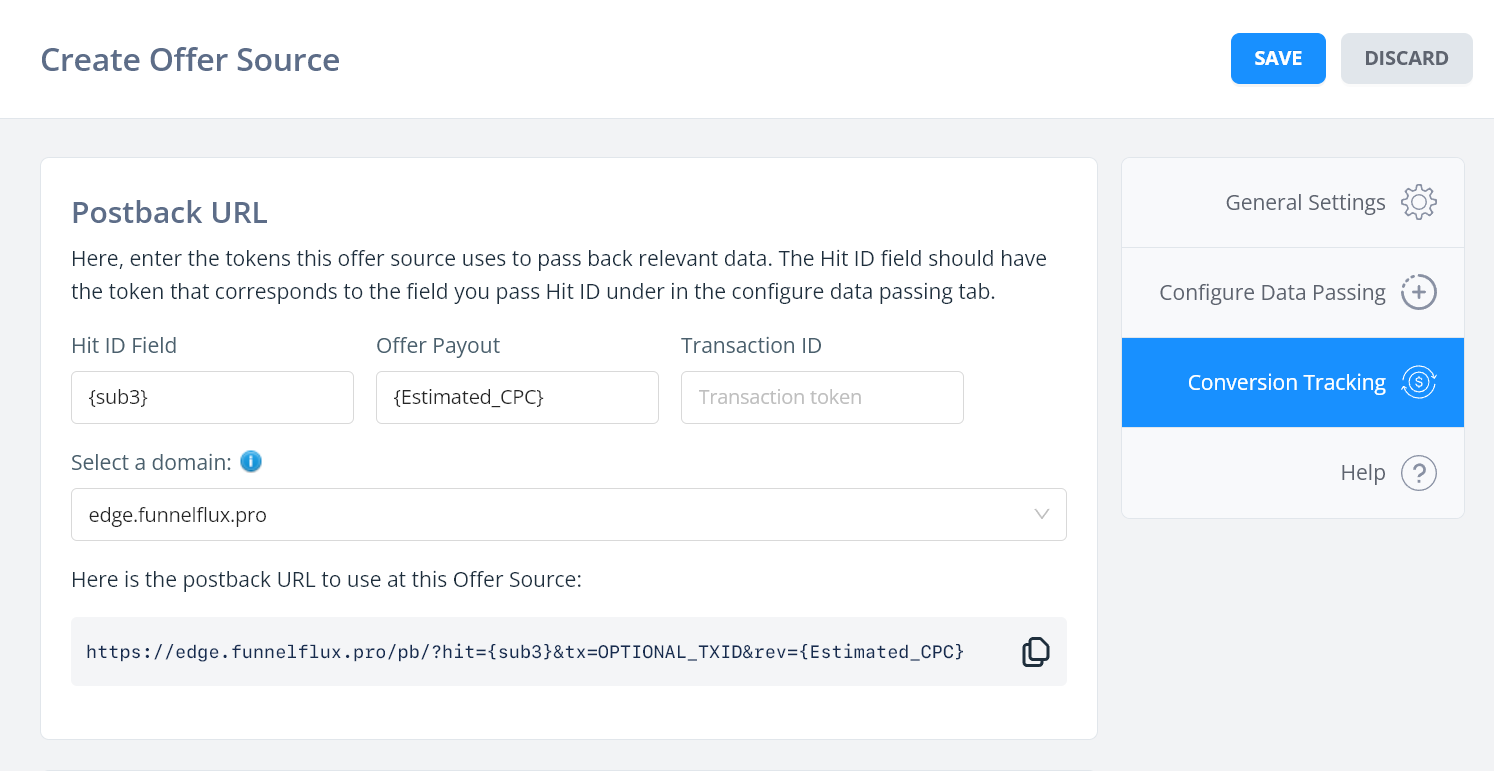
Configuring traffic sources used
As mentioned earlier, we need to pass custom data (ad title, network, site IDs) from the traffic source, and it's these values that are passed through to Sedo.
Check the earlier picture -- we use the {data-ad_title}and {data-site_id} token. We also have five keywords to pass.
So, I would recommend making a new traffic source dedicated to search arbitrage via Sedo, e.g. TikTok (Sedo).
You can use the appropriate template, then add or adjust the parameters. Taking our TikTok template as an example:
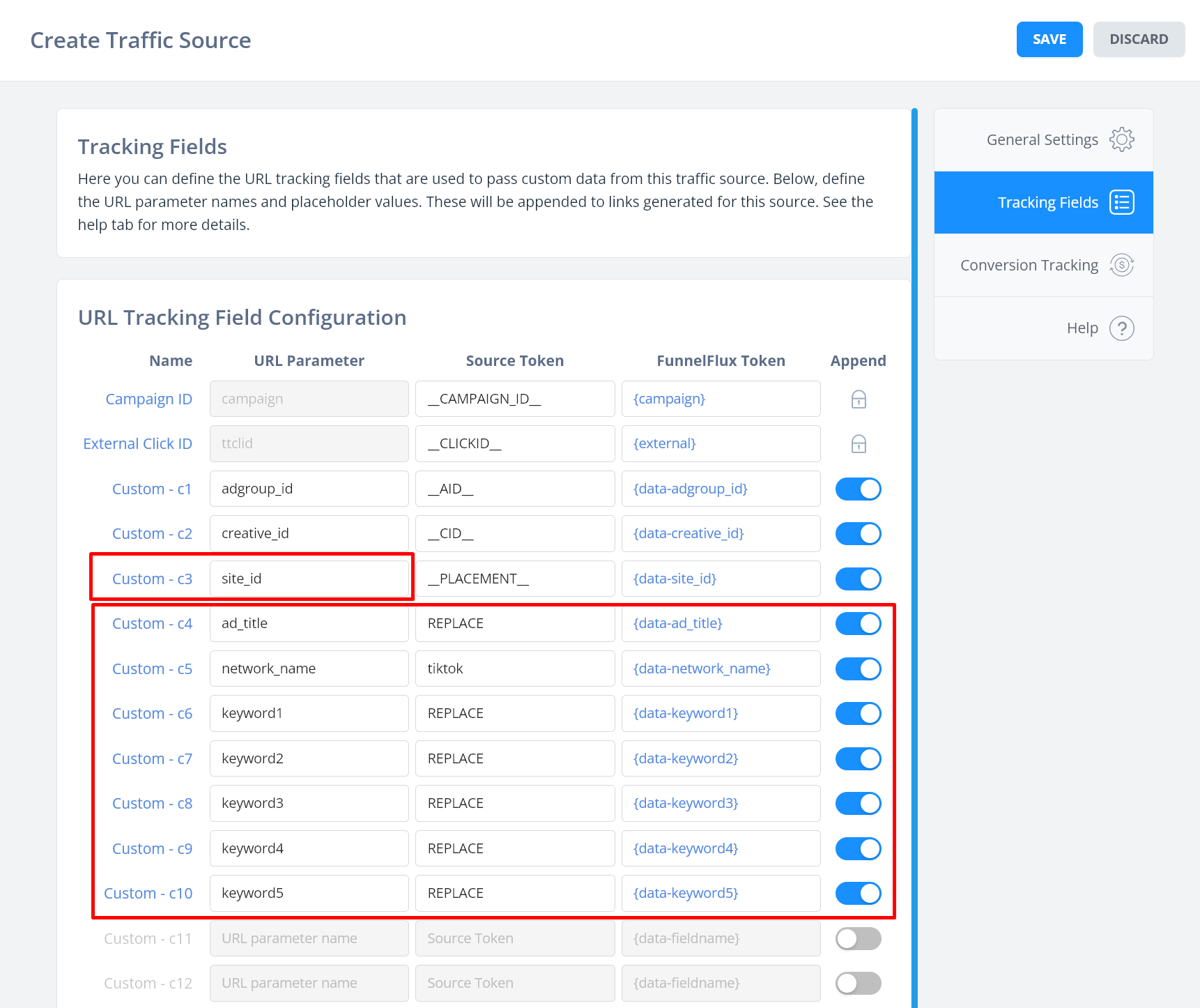
Here I did quite a few things:
- I renamed placement to
site_id, which already had the placement token, so the parameter name matches our offer source data passing config - I added the ad_title tracking field with
REPLACEas the value -- so in generated URLs, you would manually change this REPLACE word to some encoded title string - I added network_name and hard-coded it to the value tiktok
- I added fields for
keyword1throughkeyword5, again withREPLACEas the placeholder
Because TikTok has no ad titles/headlines, and of course no keywords, you would need to manually replace all REPLACE values in your URL generated from FunnelFlux, per ad, to pass appropriate data.
This can be quite a lot, so you may want to create an Excel spreadsheet where you have a base tracking link from FunnelFlux, then columns for ad title and keywords, then generate an output URL yourself to copy/paste. Less human error this way (I'll try to add an Excel spreadsheet template here later).
Admittedly we could (and probably will) adjust all our templates to use the same parameter names as much as possible across many sources, making the tracking coordination a bit easier. But, it's important that you understand how this data passing actually works -- otherwise it's easy to blindly connect A > B, copy/paste values and not understand why it's not working.
Search arbitrage tracking is tricky, so it's important to have a strong grasp on what data is being passed and where it's coming from. Otherwise you may make costly mistakes later.
Taking another example of Taboola:
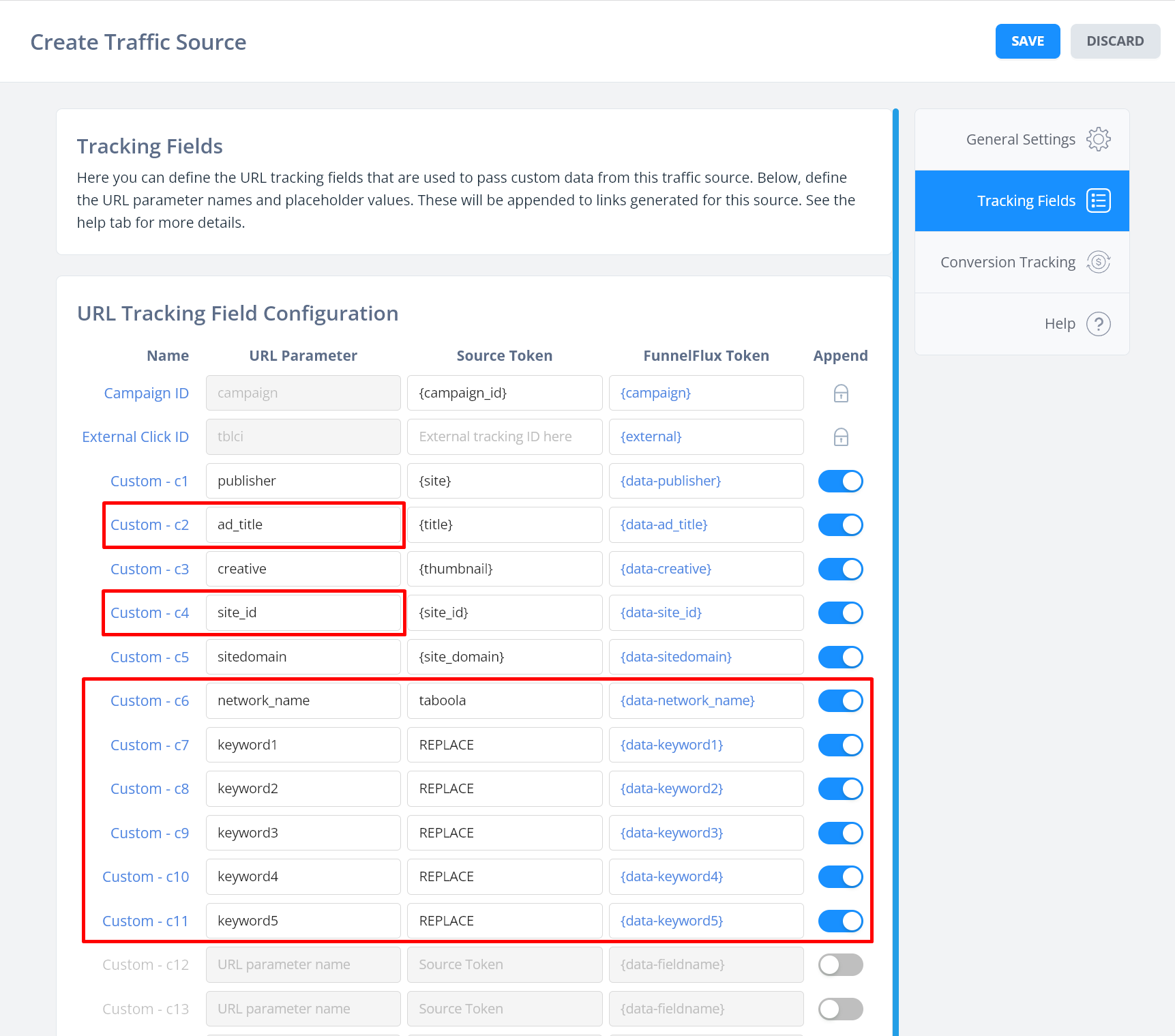
Here, Taboola does have data passing for titles and site IDs
However the URL parameter names in our template didn't match the data passing scheme for our Sedo template. So, I just edited there names to ad_title and site_id to line things up.
Additionally, I added the network_name parameter and hard-coded the value to taboola, and then added all the keyword parameters.
Passing keyword data to offers
For Sedo offers, you would create an offer then use your arbitrage domain as the base page URL. The rest of the URL structure would be handled by the data passing section. You can check the data passing tab for any offer and you will see the final output URL that FunnelFlux will be redirecting to.
Sedo expects multiple keywords to be passed -- up to 5 of them. Some search arbitrage partners use the ad title or a single long keyword string. Sedo makes it a bit trickier, but everything becomes easier once you establish routine and understand the tracking.
So, there's two ways to coordinate passing of this data.
Option 1: Pass in the URL from the traffic source
This is the configuration you are using above.
With this, your offer would just be a single offer (the search arbitrage domain URL) and you would create different ads – which can pass different keyword values – generate different search results.
In reporting, you would break down by this ad title tracking field to analyse performance, as well as keyword fields.
Option 2: Passing at the offer level
Now, since this is all data passing configured by the offer source/offer, you could instead opt to hard-code it at the offer level.
So you could create your offer, pick Sedo as the offer source, then go to data passing and add an offer-level override for the adtitle field, as well as keyword1 through keyword5 as desired, using the custom string option.
In this way you could create multiple offers for different ad titles/keywords and rotate these in your funnels like any offer.
Now, the values would not depend on your ads in the traffic source and are controlled inside FunnelFlux:
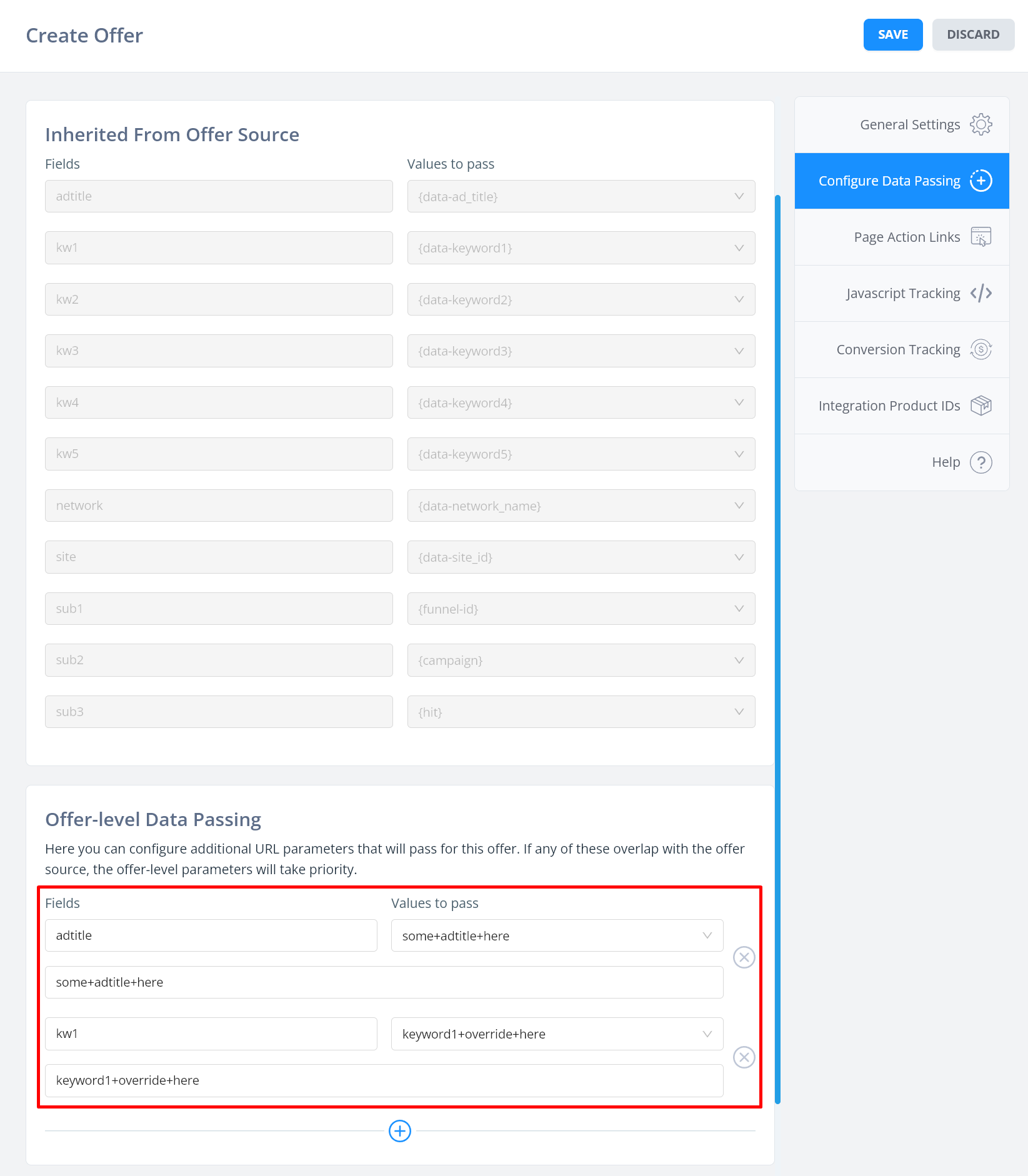
Now in reporting you could have your keywords separated into different offers.
The upside here is more control within FunnelFlux and being able to change these at any time or add/remove pages from rotation without touching your ads.
The downside is more manual work with creating offers and configuring your funnel, and potential lack of congruency between your ads and your search arbitrage pages.
You'll also need to consider compliance, and whether for sources with ad titles, the search arbitrage partner is OK with you passing various keywords that may not match the ad displayed to users.
Conversion tracking
In general with search arbitrage, just follow our guide and then use the template postback URL provided on the conversion tracking page.
However, there's some important things to consider with which events to track. Please read below:
- In general with algorithmically driven sources like Facebook, TikTok, etc. you will want to send conversions immediately from the search arbitrage provider
- However, these will have estimated revenue and will result in FunnelFlux data not aligning fully with your arbitrage provider, when they later update these estimates
- If the provider has multiple postback options, e.g. pre-estimated, estimated (2h), estimated (24h) etc., you can add a postback to one of these as well to update data in FunnelFlux.
- HOWEVER, you do not want this to send another event to the traffic source, as it will likely inflate conversions. To prevent this, add
...&disable_postbacks=trueto the later postback - This will send the event to FunnelFlux, which will update the conversion and it's revenue, but will NOT fire an event to the traffic source.


